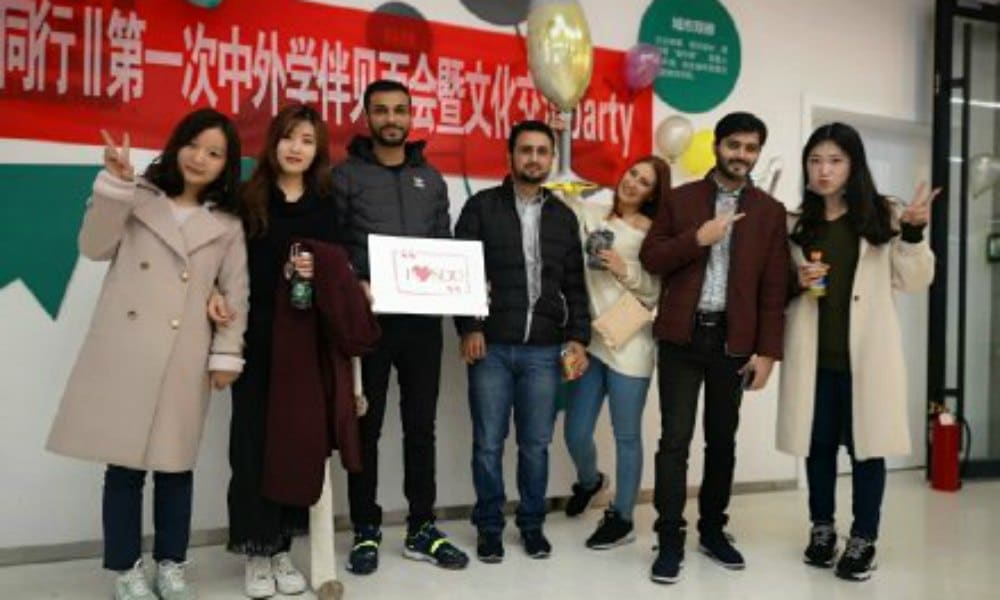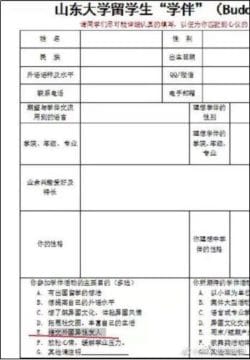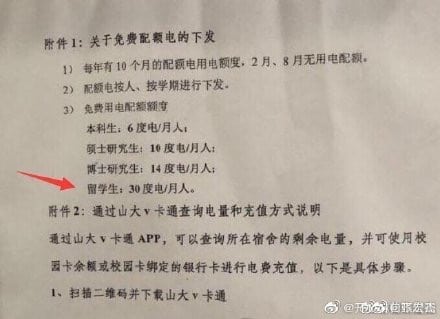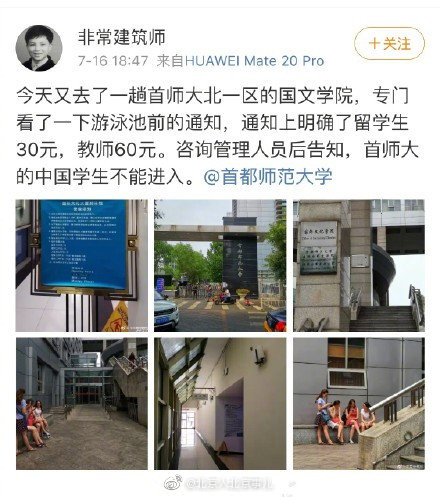China Insight
‘Preferential Treatment’ of Foreign Students in China: Top 3 Controversies This Week
A wave of sentiment against foreign students is taking over Chinese social media this week.
Published
5 years agoon

The treatment of foreign students in China is a major topic of discussion this week, as various stories involving apparent favoritism of exchange students are making their rounds on Chinese social media. This is a top 3 of trending issues.
Recently, there have been many discussions on Chinese social media on the alleged preferential treatment of foreign (exchange) students in China.
Various topics popping up over the past week have triggered anger among netizens about foreign students being allowed to come and study China under favorable conditions.
Some netizens think foreign students make use of the situation and refer to these students as ‘foreign trash’ (洋垃圾).
Although there are many different stories making their rounds, these are the three main news topics of the moment relating to ‘favoritism’ of foreign students compared to Chinese students.
1. Arranging ‘Girlfriends’: Shandong’s Study Buddy System Sparks Outrage Online

The first story relating to foreign students that has been making news recently is that of preferential treatment of foreigners at Shandong University.
It is this story that later led to more stories coming out about supposed unequal standards for overseas students in China.
The outrage started after a registration form from Shandong University for students to apply as a “buddy” to exchange students made its rounds on Chinese social media.

The form clearly states “making a foreign friend of the opposite sex” as one of its options.
As explained by SupChina, the study buddy program (学伴制度) was established in 2016 to promote cooperation between foreign and Chinese students.
This year’s application forms show that multiple Chinese volunteers are now grouped and assigned to one foreign student to assist them with school assignments or to keep them company during other (social) activities.
One extreme case in which 25 Chinese students attended to the needs of one single exchange student stirred discussions online. The graduate student from Zimbabwe, who did not speak Chinese, was admitted to the hospital for 25 days for a broken leg and the university had arranged one volunteering student to come to the hospital every day.
The form also showed a specific focus on gender, requiring students to choose options for becoming a study buddy, including that of “making foreign friends of the opposite sex” (“结交外国异性友人”) and allowing them to indicate their preference for their matched buddy’s personality.
A notice circulating on Weibo from the university showed that 47 foreigners taking part in the program were each matched with three Chinese students, most of them female.
This led to people wondering if Shandong University was acting as an educational institute or a matchmaking company, and accused the university of arranging girlfriends for male foreign students.
Shandong University has since apologized and said it would conduct a “thorough research” of its Buddy Programme.
Not all people, however, understand what all the fuss is about. As one popular Weibo blogger noted: “Shandong University’s Buddy System is voluntary, and it is optional to choose the preferred gender of the exchange student, there is no need to fill this out.”
2. Lenient Laws? Foreign Student Traffic Police Incident

Another incident sparking controversy occurred on July 9 in the city of Fuzhou, where an international student from the Fujian Agriculture and Forestry University was caught breaking traffic rules on his electric scooter – he was carrying another individual.
When the traffic police stopped the man, he resisted with violence and tried to push the officer out of his way.
Yet, despite his apparent aggressive behavior, the man reportedly was only penalized for his traffic offense and did not face any other legal punishments.
The man has been identified as an Egyptian student by the name of Younes.
One Weibo thread reporting on the incident received approximately 37,000 comments and neared half a million likes.
Although Chinese social media users were angered that the man was let go so easily, the Epoch Times, a news outlet highly critical of China, stated that laws in China about carrying passengers on mopeds are loosely and often arbitrarily enforced.
Instead of reporting favoritism, the Epoch Times article suggests that the incident actually signals towards a bias against foreigners, which is allegedly part of a Chinese media campaign that “portrays Westerners inside China in an increasingly negative light.”
A bystander video of the incident shows the foreign man shouting at the traffic police and even chasing him.
“Why was he not punished for attacking the policeman?” many on Weibo wonder: “He should be expelled from school and sent back home!”
The hashtag “Foreign Student Violates Law, Then Jostles with Traffic Police” (#外籍学生违反交规推搡交警), hosted by CCTV, received 110 million views on Weibo.
On July 15, the Ministry of Foreign Affairs also responded to these online discussions, saying that China welcomes foreign students to study in China to promote mutual understanding and friendships between China and other countries. They also stressed that foreign students should always abide by Chinese laws and regulations.
3. Unequal Standards: Dorm Disparity

Dorm disparity between Chinese and foreign students has been a topic of discussion for some time.
In 2018, a short movie went viral on Chinese social media exposing the big differences between the dorm conditions of Chinese students and of foreigners studying in China, causing controversy online.
Amidst all recent discussions on foreign students in China, the dorm discussion has also flared up again.
On July 19, one Chinese netizen noted that the Shandong Agriculture University was refurbishing its guesthouse facilities, where the foreign students live, while photos showed that the Chinese dorms are in abominable conditions.

“Why can’t they live together with Chinese students?” many commenters wonder: “Are Chinese students of a lower rank?”
On July 12, the Shandong Finance & Economics University dorms also became a topic of discussion on Weibo after management required Chinese students to move to another dorm twenty minutes further away so that they could let foreign students live in their dorms instead.
Following online protests, the management decided to halt the dorm move.
Another story getting big this week involves the different electricity quota for foreign students at a Shandong University dorm, where ‘exchange students’ as a separate category are allowed to freely use 30 kWh per month, more than double of what (Chinese) graduate students are allowed to use.

“This is a disgrace to our country,” some commenters said.
Depending on the university, Chinese students often do not have the option to live in foreign dorms, while foreigners often also do not have the option to live in Chinese dorms. In some universities, however, students live together.
At present, just as in the discussions in 2018, there are also commenters noting that foreign students often pay much more for their dorms; exchange students often pay daily fees whereas Chinese students pay per semester. Price differences can be as much as 8 to 10 times more for foreign students’ dormitories.
University Swimming Pool ‘Only for Foreigners’
While more and more people are now calling for more equal standards between Chinese and foreign dormitories, “Capital Normal University discriminates against Chinese” is the statement that is now making its rounds on Chinese social media – further heightening discussions on unequal dorm situations.
On July 17, one netizen posted photos of the regulations at the swimming pool of the Capital Normal University in Beijing.

According to the sign, teachers and staff are allowed to enter the swimming pool for 60 yuan ($8,7), exchange students can enter for 30 yuan ($4,3), and Chinese students cannot enter at all.

Many people on social media responded to the issue with anger, saying that Chinese students were being “treated like dogs.”
The university issued a response to the controversy on July 18, stating that the swimming pool in question is located in the university’s Grand Building and is part of its facilities.
Because the pool is small (25 x 12.5 meters), it is only meant to be used by those teachers, staff, and students, who are living or working within the Grand Building, with staff paying full price and students paying half.
The statement says that the sign as posted on social media contained “an error” which was already adjusted in January of 2019.
The hashtag “Normal University Responds to Swimming Pool Issue” (#首师大回应游泳馆问题#) received 160 million views at the time of writing. Many people among the thousands who reacted still think the sign is unforgivable.
Although all these controversies led to some people negatively expressing themselves about foreign students, there are also many who note that it is not about foreign students per se, but about their selective treatment by universities and/or authorities.
In response to these controversies, state media outlet Global Times published an ‘opinion piece’ on July 17 which stated that offering foreigners certain special treatment has been the norm in China for a long time, as only a small number of foreigners would come to China, and Chinese were eager to show courtesy to every guest.
But, “times have changed,” the author argues: “With more expats [sic] living in China, some people’s obsequiousness for foreigners might lead to resentment and social unease.”
The author notes that some foreigners receive preferential treatment in China while being outlawed in their own countries.
“We should be neither xenophobic nor xenocentric,” the conclusion says: “As a rising power that is looking at opening up wider, fair and equal treatment of foreigners is a lesson we ought to learn.”
By Manya Koetse and Miranda Barnes
Follow @whatsonweibo
Spotted a mistake or want to add something? Please let us know in comments below or email us. Please note that your comment below will need to be manually approved if you’re a first-time poster here.
©2019 Whatsonweibo. All rights reserved. Do not reproduce our content without permission – you can contact us at info@whatsonweibo.com
Stories that are authored by the What's on Weibo Team are the stories that multiple authors contributed to. Please check the names at the end of the articles to see who the authors are.

Also Read
China Insight
The Tragic Story of “Fat Cat”: How a Chinese Gamer’s Suicide Went Viral
The story of ‘Fat Cat’ has become a hot topic in China, sparking widespread sympathy and discussions online.
Published
3 months agoon
May 9, 2024
The tragic story behind the recent suicide of a 21-year-old Chinese gamer nicknamed ‘Fat Cat’ has become a major topic of discussion on Chinese social media, touching upon broader societal issues from unfair gender dynamics to businesses taking advantage of grieving internet users.
The story of a 21-year-old Chinese gamer from Hunan who committed suicide has gone completely viral on Weibo and beyond this week, generating many discussions.
In late April of this year, the young man nicknamed ‘Fat Cat’ (胖猫 Pàng Māo, literally fat or chubby cat), tragically ended his life by jumping into the river near the Chongqing Yangtze River Bridge (重庆长江大桥) following a breakup with his girlfriend. By now, the incident has come to be known as the “Fat Cat Jumping Into the River Incident” (胖猫跳江事件).
News of his suicide soon made its rounds on the internet, and some bloggers started looking into what was behind the story. The man’s sister also spoke out through online channels, and numerous chat records between the young man and his girlfriend emerged online.
One aspect of his story that gained traction in early May is the revelation that the man had invested all his resources into the relationship. Allegedly, he made significant financial sacrifices, giving his girlfriend over 510,000 RMB (approximately 71,000 USD) throughout their relationship, in a time frame of two years.
When his girlfriend ended the relationship, despite all of his efforts, he was devastated and took his own life.
The story was picked up by various Chinese media outlets, and prominent social and political commentator Hu Xijin also wrote a post about Fat Cat, stating the sad story had made him tear up.
As the news spread, it sparked a multitude of hashtags on Weibo, with thousands of netizens pouring out their thoughts and emotions in response to the story.
Playing Games for Love
The main part of this story that is triggering online discussions is how ‘Fat Cat,’ a young man who possessed virtually nothing, managed to provide his girlfriend, who was six years older, with such a significant amount of money – and why he was willing to sacrifice so much in order to do so.
The young man reportedly was able to make money by playing video games, specifically by being a so-called ‘booster’ by playing with others and helping them get to a higher level in multiplayer online battle games.
According to his sister, he started working as a ‘professional’ video gamer as a means of generating money to satisfy his girlfriend, who allegedly always demanded more.
He registered a total of 36 accounts to receive orders to play online games, making 20 yuan per game (about $2.80). Because this consumed all of his time, he barely went out anymore and his social life was dead.
In order to save more money, he tried to keep his own expenses as low as possible, and would only get takeout food for himself for no more than 10 yuan ($1,4). His online avatar was an image of a cat saying “I don’t want to eat vegetables, I want to eat McDonald’s.”

The woman in question who he made so many sacrifices for is named Tan Zhu (谭竹), and she soon became the topic of public scrutiny. In one screenshot of a chat conversation between Tan and her boyfriend that leaked online, she claimed she needed money for various things. The two had agreed to get married later in this year.
Despite of this, she still broke up with him, driving him to jump off the bridge after transferring his remaining 66,000 RMB (9135 USD) to Tan Zhu.
As the story fermented online, Tan Zhu also shared her side of the story. She claimed that she had met ‘Fat Cat’ over two years ago through online gaming and had started a long distance relationship with him. They had actually only met up twice before he moved to Chongqing. She emphasized that financial gain was never a motivating factor in their relationship.
Tan additionally asserted that she had previously repaid 130,000 RMB (18,000 USD) to him and that they had reached a settlement agreement shortly before his tragic death.
Ordering Take-Out to Mourn Fat Cat
– “I hope you rest in peace.”
– “Little fat cat, I hope you’ll be less foolish in your next life.”
– “In your next life, love yourself first.”
These are just a few of the messages left by netizens on notes attached to takeout food deliveries near the Chongqing Yangtze River Bridge.

AI-generated image spread on Chinese social media in connection to the event.
As Fat Cat’s story stirred up significant online discussion, with many expressing sympathy for the young man who rarely indulged in spending on food and drinks, some internet users took the step of ordering McDonalds and other food delivery services to the bridge, where he tragically jumped from, in his honor.
This soon snowballed into more people ordering food and drinks to the bridge, resulting in a constant flow of delivery staff and a pile-up of take-out bags.

Delivery food on the bridge, photo via Weibo.
However, as the food delivery efforts picked up pace, it came to light that some of the deliveries ordered and paid for were either empty or contained something different; certain restaurants, aware of the collective effort to honor the young man, deliberately left the food boxes empty or substituted sodas or tea with tap water.

At least five restaurants were caught not delivering the actual orders. Chinese bubble tea shop ChaPanda was exposed for substituting water for milk tea in their cups. On May 3rd, ChaPanda responded that they had fired the responsible employee.
Another store, the Zhu Xiaoxiao Luosifen (朱小小螺蛳粉), responded on that they had temporarily closed the shop in question to deal with the issue. Chinese fast food chain NewYobo (牛约堡) also acknowledged that at least twenty orders they received were incomplete.
Fast food company Wallace (华莱士) responded to the controversy by stating they had dismissed the employees involved. Mixue Ice Cream & Tea (蜜雪冰城) issued an apology and temporarily closed one of their stores implicated in delivering empty orders.
In the midst of all the controversy, Fat Cat’s sister asked internet users to refrain from ordering take-out food as a means of mourning and honoring her brother.
Nevertheless, take-out food and flowers continued to accumulate near the bridge, prompting local authorities to think of ways of how to deal with this unique method of honoring the deceased gamer.
Gamer Boy Meets Girl
On Chinese social media, this story has also become a topic of debate in the context of gender dynamics and social inequality.
There are some male bloggers who are angry with Tan Zhu, suggesting her behaviour is an example of everything that’s supposedly “wrong” with Chinese women in this day and age.
Others place blame on Fat Cat for believing that he could buy love and maintain a relationship through financial means. This irked some feminist bloggers, who see it as a chauvinistic attitude towards women.
A main, recurring idea in these discussions is that young Chinese men such as Fat Cat, who are at the low end of the social ladder, are actually particularly vulnerable in a fiercely competitive society. Here, a gender imbalance and surplus of unmarried men make it easier for women to potentially exploit those desperate for companionship.
The story of Fat Cat brings back memories of ‘Mo Cha Official,’ a not-so-famous blogger who gained posthumous fame in 2021 when details of his unhappy life surfaced online.
Likewise, the tragic tale of WePhone founder Su Xiangmao (苏享茂) resurfaces. In 2017, the 37-year-old IT entrepreneur from Beijing took his own life, leaving behind a note alleging blackmail by his 29-year-old ex-wife, who demanded 10 million RMB (±1.5 million USD) (read story).
Another aspect of this viral story that is mentioned by netizens is how it gained so much attention during the Chinese May holidays, coinciding with the tragic news of the southern China highway collapse in Guangdong. That major incident resulted in the deaths of at least 48 people, and triggered questions over road safety and flawed construction designs. Some speculate that the prominence given to the Fat Cat story on trending topic lists may have been a deliberate attempt to divert attention away from this incident.
‘Fat Cat’ was cremated. His family stated their intention to take necessary legal steps to recover the money from his former girlfriend, but Tan Zhu reportedly already reached an agreement with the father and settled the case. Nevertheless, the case continues to generate discussions online, with some people wondering: “Is it over yet? Can we talk about something different now?”

Fat Cat images projected in Times Square
However, given that images of the ‘Fat Cat’ avatar have even appeared in Times Square in New York by now (Chinese internet users projected it on one of the big LED screens), it’s likely that this story will be remembered and talked about for some time to come.
UPDATE MAY 25
On May 20, local authorities issued a lengthy report to clarify the timeline of events and details surrounding the death of “Fat Cat,” which had attracted significant attention across China.
The report concluded that there was no fraud involved and that “Fat Cat” and his girlfriend were in a genuine relationship. Tan did not deceive “Fat Cat” for money; the transfers were voluntary. Furthermore, Tan returned most of the money to his parents.
The gamer’s sister is reportedly still being investigated for potentially infringing on Tan’s privacy by disclosing numerous private details to the public.
In the end, one thing is clear in this gamer’s tragic story, which is that there are no winners.
By Manya Koetse
– With contributions by Miranda Barnes and Ruixin Zhang
Independently reporting China trends for over a decade. Like what we do? Support us and get the story behind the hashtag by subscribing:
Spotted a mistake or want to add something? Please let us know in comments below or email us. First-time commenters, please be patient – we will have to manually approve your comment before it appears.
©2024 Whatsonweibo. All rights reserved. Do not reproduce our content without permission – you can contact us at info@whatsonweibo.com.
China Brands, Marketing & Consumers
A Brew of Controversy: Lu Xun and LELECHA’s ‘Smoky’ Oolong Tea
Chinese tea brand LELECHA faced backlash for using the iconic literary figure Lu Xun to promote their “Smoky Oolong” milk tea, sparking controversy over the exploitation of his legacy.
Published
3 months agoon
May 3, 2024
It seemed like such a good idea. For this year’s World Book Day, Chinese tea brand LELECHA (乐乐茶) put a spotlight on Lu Xun (鲁迅, 1881-1936), one of the most celebrated Chinese authors the 20th century and turned him into the the ‘brand ambassador’ of their special new “Smoky Oolong” (烟腔乌龙) milk tea.
LELECHA is a Chinese chain specializing in new-style tea beverages, including bubble tea and fruit tea. It debuted in Shanghai in 2016, and since then, it has expanded rapidly, opening dozens of new stores not only in Shanghai but also in other major cities across China.
Starting on April 23, not only did the LELECHA ‘Smoky Oolong” paper cups feature Lu Xun’s portrait, but also other promotional materials by LELECHA, such as menus and paper bags, accompanied by the slogan: “Old Smoky Oolong, New Youth” (“老烟腔,新青年”). The marketing campaign was a joint collaboration between LELECHA and publishing house Yilin Press.

Lu Xun featured on LELECHA products, image via Netease.
The slogan “Old Smoky Oolong, New Youth” is a play on the Chinese magazine ‘New Youth’ or ‘La Jeunesse’ (新青年), the influential literary magazine in which Lu’s famous short story, “Diary of a Madman,” was published in 1918.
The design of the tea featuring Lu Xun’s image, its colors, and painting style also pay homage to the era in which Lu Xun rose to prominence.
Lu Xun (pen name of Zhou Shuren) was a leading figure within China’s May Fourth Movement. The May Fourth Movement (1915-24) is also referred to as the Chinese Enlightenment or the Chinese Renaissance. It was the cultural revolution brought about by the political demonstrations on the fourth of May 1919 when citizens and students in Beijing paraded the streets to protest decisions made at the post-World War I Versailles Conference and called for the destruction of traditional culture[1].
In this historical context, Lu Xun emerged as a significant cultural figure, renowned for his critical and enlightened perspectives on Chinese society.
To this day, Lu Xun remains a highly respected figure. In the post-Mao era, some critics felt that Lu Xun was actually revered a bit too much, and called for efforts to ‘demystify’ him. In 1979, for example, writer Mao Dun called for a halt to the movement to turn Lu Xun into “a god-like figure”[2].
Perhaps LELECHA’s marketing team figured they could not go wrong by creating a milk tea product around China’s beloved Lu Xun. But for various reasons, the marketing campaign backfired, landing LELECHA in hot water. The topic went trending on Chinese social media, where many criticized the tea company.
Commodification of ‘Marxist’ Lu Xun
The first issue with LELECHA’s Lu Xun campaign is a legal one. It seems the tea chain used Lu Xun’s portrait without permission. Zhou Lingfei, Lu Xun’s great-grandson and president of the Lu Xun Cultural Foundation, quickly demanded an end to the unauthorized use of Lu Xun’s image on tea cups and other merchandise. He even hired a law firm to take legal action against the campaign.
Others noted that the image of Lu Xun that was used by LELECHA resembled a famous painting of Lu Xun by Yang Zhiguang (杨之光), potentially also infringing on Yang’s copyright.
But there are more reasons why people online are upset about the Lu Xun x LELECHA marketing campaign. One is how the use of the word “smoky” is seen as disrespectful towards Lu Xun. Lu Xun was known for his heavy smoking, which ultimately contributed to his early death.
It’s also ironic that Lu Xun, widely seen as a Marxist, is being used as a ‘brand ambassador’ for a commercial tea brand. This exploits Lu Xun’s image for profit, turning his legacy into a commodity with the ‘smoky oolong’ tea and related merchandise.
“Such blatant commercialization of Lu Xun, is there no bottom limit anymore?”, one Weibo user wrote. Another person commented: “If Lu Xun were still alive and knew he had become a tool for capitalists to make money, he’d probably scold you in an article. ”
On April 29, LELECHA finally issued an apology to Lu Xun’s relatives and the Lu Xun Cultural Foundation for neglecting the legal aspects of their marketing campaign. They claimed it was meant to promote reading among China’s youth. All Lu Xun materials have now been removed from LELECHA’s stores.

Statement by LELECHA.
On Chinese social media, where the hot tea became a hot potato, opinions on the issue are divided. While many netizens think it is unacceptable to infringe on Lu Xun’s portrait rights like that, there are others who appreciate the merchandise.
The LELECHA controversy is similar to another issue that went trending in late 2023, when the well-known Chinese tea chain HeyTea (喜茶) collaborated with the Jingdezhen Ceramics Museum to release a special ‘Buddha’s Happiness’ (佛喜) latte tea series adorned with Buddha images on the cups, along with other merchandise such as stickers and magnets. The series featured three customized “Buddha’s Happiness” cups modeled on the “Speechless Bodhisattva” (无语菩萨), which soon became popular among netizens.

The HeyTea Buddha latte series, including merchandise, was pulled from shelves just three days after its launch.
However, the ‘Buddha’s Happiness’ success came to an abrupt halt when the Ethnic and Religious Affairs Bureau of Shenzhen intervened, citing regulations that prohibit commercial promotion of religion. HeyTea wasted no time challenging the objections made by the Bureau and promptly removed the tea series and all related merchandise from its stores, just three days after its initial launch.
Following the Happy Buddha and Lu Xun milk tea controversies, Chinese tea brands are bound to be more careful in the future when it comes to their collaborative marketing campaigns and whether or not they’re crossing any boundaries.
Some people couldn’t care less if they don’t launch another campaign at all. One Weibo user wrote: “Every day there’s a new collaboration here, another one there, but I’d just prefer a simple cup of tea.”
By Manya Koetse
[1]Schoppa, Keith. 2000. The Columbia Guide to Modern Chinese History. New York: Columbia UP, 159.
[2]Zhong, Xueping. 2010. “Who Is Afraid Of Lu Xun? The Politics Of ‘Debates About Lu Xun’ (鲁迅论争lu Xun Lun Zheng) And The Question Of His Legacy In Post-Revolution China.” In Culture and Social Transformations in Reform Era China, 257–284, 262.
Independently reporting China trends for over a decade. Like what we do? Support us and get the story behind the hashtag by subscribing:
Spotted a mistake or want to add something? Please let us know in comments below or email us. First-time commenters, please be patient – we will have to manually approve your comment before it appears.
©2024 Whatsonweibo. All rights reserved. Do not reproduce our content without permission – you can contact us at info@whatsonweibo.com.
Subscribe

Weibo Watch: The Future is Here

“Bye Bye Biden”: Biden’s Many Nicknames in Chinese

Enjoying the ‘Sea’ in Beijing’s Ditan Park

A Triumph for “Comrade Trump”: Chinese Social Media Reactions to Trump Rally Shooting

Weibo Watch: Get Up, Stand Up

The Tragic Story of “Fat Cat”: How a Chinese Gamer’s Suicide Went Viral

“Old Bull Eating Young Grass”: 86-Year-Old Chinese Painter Fan Zeng Marries 36-Year-Old Xu Meng

A Brew of Controversy: Lu Xun and LELECHA’s ‘Smoky’ Oolong Tea

Singing Competition or Patriotic Fight? Hunan TV’s ‘Singer 2024’ Stirs Nationalistic Sentiments

Zara Dress Goes Viral in China for Resemblance to Haidilao Apron

Weibo Watch: The Battle for the Bottom Bed

About the “AI Chatbot Based on Xi Jinping” Story

China’s Intensified Social Media Propaganda: “Taiwan Must Return to Motherland”

Weibo Watch: Telling China’s Stories Wrong

Saying Goodbye to “Uncle Wang”: Wang Wenbin Becomes Chinese Ambassador to Cambodia
Get in touch
Would you like to become a contributor, or do you have any tips or suggestions? Get in touch here!
Popular Reads
-

 China Insight3 months ago
China Insight3 months agoThe Tragic Story of “Fat Cat”: How a Chinese Gamer’s Suicide Went Viral
-

 China Music4 months ago
China Music4 months agoThe Chinese Viral TikTok Song Explained (No, It’s Not About Samsung)
-

 China Digital10 months ago
China Digital10 months agoToo Sexy for Weibo? Online Discussions on the Concept of ‘Cābiān’
-

 China Arts & Entertainment12 months ago
China Arts & Entertainment12 months agoBehind 8 Billion Streams: Who is Dao Lang Cursing in the Chinese Hit Song ‘Luocha Kingdom’?




